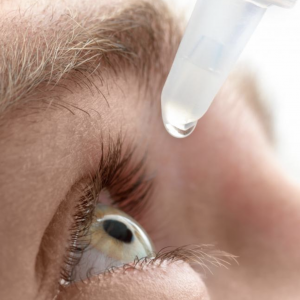Using Artificial Tears for Dry Eyes

Artificial tears for eye drops help moisturize the surface of your eyes and are available without a prescription. Besides lubricating your eyes, some artificial tears promote healing and decrease tear evaporation.
Causes of Dry Eyes
Your eyes become dry when your tears no longer provide enough moisture to keep them lubricated. The cornea can become irritated when there is a lack of moisture. Factors that cause dry eyes can include aging, seasonal allergies, certain medications, a cold, a medical condition, extended computer use, prolonged eye strain, tiredness, eye surgery and smoky or windy environmental factors.
Before You Purchase Eye Drops
The best eye drops for you may depend on what is causing your eye dryness. Make a list of symptoms to help determine the best eye drops for you before you visit the pharmacy or store. Over-the-counter (OTC) eye drops help alleviate many common eye discomfort symptoms. Eye drops also can be purchased as nonprescription gels and gel inserts, which may cause temporary blurred vision. They are usually recommended to be put in at night before bedtime. If you wear contact lens, contact lens-friendly eye drops may be more suitable for you.
With Preservatives or Preservative Free?
There are two main types of artificial tears – those available with preservatives and those without.
- Eye drops with preservatives usually come in multi-dose bottles and contain preservatives that help prevent bacteria growth. Preservatives may irritate your eyes, especially if you have moderate or severe dry eyes. Eye drops with preservatives are generally not recommended for people with more serious eye dryness.
- Preservative-free or sterile saline eye drops have fewer additives and may come in single-dose vials to cleanse and moisturize the eyes. They are generally recommended if you apply artificial tears more than four times a day, or if you have moderate or severe dry eyes. Your doctor may recommend drops that contain oil if you have a lack of oil production by your eyelids’ oil glands.
What Else Can I Try If Eye Drops Do Not Work?
Certain products remove eye redness temporarily, but they don’t treat the causes of eye dryness. If these OTC products do not relieve your dry eyes, you may want to try one or more artificial tear ointments. You also should make an appointment with an eye doctor (ophthalmologist or optometrist) to seek other treatments and rule out infection or a more serious condition. Prescription medication may be prescribed to relieve chronic dry eye symptoms and reduce damage to the eyes. You also should have your eyes checked annually.
Eye Drops Safety
To help protect your eyes from infection, follow these safety tips:
- Talk to your doctor about the appropriate duration, frequency and administration of eye drops.
- Talk to your doctor about using eye drops while taking cold and allergy medications.
- Do not share your eye drops with others.
- Avoid touching the dropper with your fingers or to your eye.
- Throw away eye drops that are contaminated or expired.
- Use eye drops for short-term relief; overuse can cause new or worsening symptoms.
Carmichael’s Crowley Retail Pharmacy offers a selection of quality OTC eye drops to meet the individual needs of our customers. Prescription medications also can be filled at our pharmacy, Monday through Friday from 9am to 6pm and Saturday from 9am to 1pm.




 Accredited/Certified by The Joint Commission
Accredited/Certified by The Joint Commission